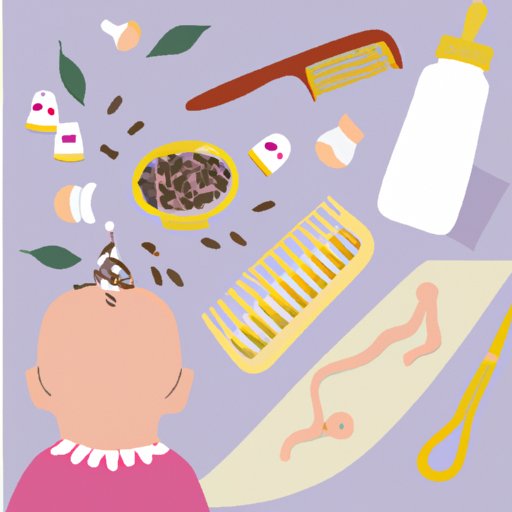Introduction
Having a baby is an incredible experience that can bring immense joy. However, for some new mothers, it can also be accompanied by a range of physical changes, one of which is postpartum hair loss. While it’s normal to lose some hair after giving birth, excessive shedding can be distressing. Fortunately, there are a number of steps you can take to help prevent or reduce postpartum hair loss.
Overview of Postpartum Hair Loss
Postpartum hair loss occurs when the normal cycle of hair growth is disrupted due to hormonal changes in the body. It typically begins three to six months after childbirth and can last for up to six months, although it may continue for longer in some cases. The amount of hair lost varies from person to person and can be mild to severe. In some cases, the hair may even become thinner before it starts to regrow.

Reasons Why Postpartum Hair Loss Occurs
During pregnancy, an increase in hormones like estrogen can cause hair follicles to remain in their resting phase for longer. This results in less hair being shed than usual. After giving birth, hormone levels return to normal and all the hair that was delayed in its growth cycle starts to fall out at once. In addition, nutrient deficiencies, stress, and certain medications can also contribute to postpartum hair loss.
Eating a Balanced Diet
A balanced diet rich in essential vitamins and minerals is necessary for healthy hair growth. Foods that are particularly beneficial for preventing postpartum hair loss include those high in protein, iron, omega-3 fatty acids, zinc, and biotin, as well as foods rich in antioxidants. Examples of these include lean meats, fish, eggs, nuts, legumes, fruits, and vegetables.
Taking Supplements
In addition to eating a balanced diet, it can also be beneficial to take certain supplements to help with postpartum hair loss. Supplements such as iron, zinc, B-complex vitamins, and omega-3 fatty acids can all help promote healthy hair growth. It’s important to talk to your doctor before taking any supplements, as some can interfere with medications or have other side effects. The recommended dosage will also vary depending on your individual needs.
Reducing Stress Levels
Stress is another factor that can contribute to postpartum hair loss. High levels of stress can lead to an increase in the production of cortisol, a hormone that can affect hair growth. To reduce stress levels, it’s important to make time for yourself and get enough rest. Exercise, yoga, meditation, and spending time with friends and family can also help to lower stress levels.
Massaging Your Scalp Regularly
Regularly massaging your scalp can also help to stimulate hair growth. Massaging increases circulation to the scalp, which helps to nourish the hair follicles and promote healthy hair growth. It also helps to reduce stress and tension, which can further help to prevent postpartum hair loss. The massage should be gentle but firm, and should be done for about five minutes at least three times a week.
Avoiding Harsh Hair Treatments
Harsh hair treatments such as bleaching, straightening, and curling can damage the hair and increase the risk of postpartum hair loss. If possible, it’s best to avoid these treatments while dealing with postpartum hair loss. If you do choose to use them, make sure to use a heat protectant to minimize damage.

Using Natural Hair Care Products
Using natural hair care products can also help to prevent postpartum hair loss. These products are free from harsh chemicals and contain ingredients that are beneficial for the hair. Examples of natural hair care products include shampoos, conditioners, and oils made from ingredients such as coconut oil, aloe vera, and argan oil.
Conclusion
Postpartum hair loss can be a difficult issue for many new mothers. Fortunately, there are steps that can be taken to help prevent or reduce postpartum hair loss, such as eating a balanced diet, taking supplements, reducing stress levels, massaging the scalp regularly, avoiding harsh hair treatments, and using natural hair care products. However, if you are concerned about your hair loss, it’s important to speak to your doctor to rule out any underlying medical conditions.


